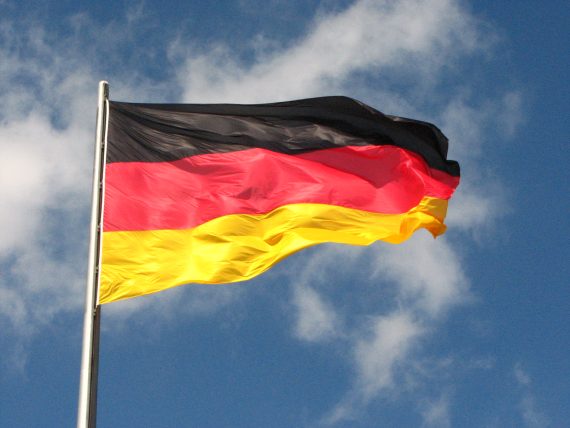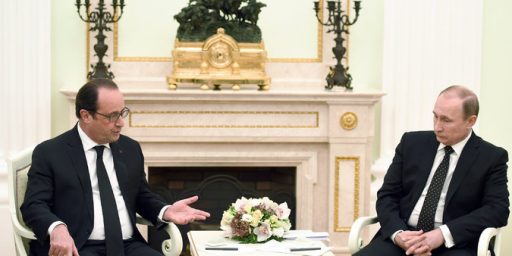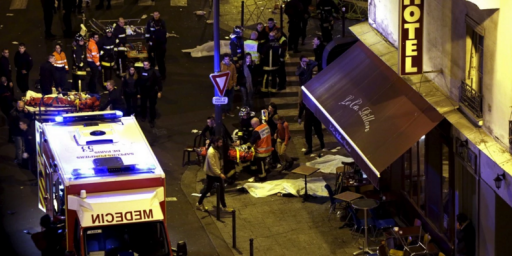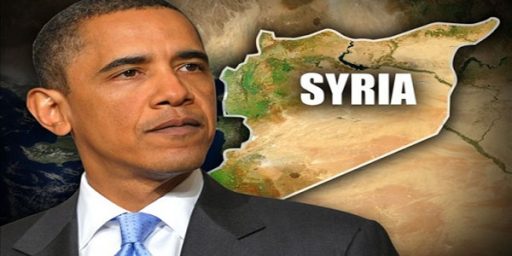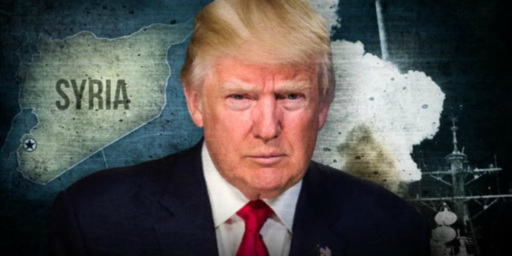German Parliament Approves Expansion Of Involvement In Anti-ISIS Campaign
The German Parliament has approved expansion of the nation's involvement in the campaign against ISIS, but that doesn't make the current campaign any less incoherent.
Following up on the vote in the British Parliament to endorse expansion of British airstrikes against ISIS to Syria, and Chancellor Angela Merkel’s decision to approve expansion of German participation in the anti-ISIS effort, the German Parliament has endorsed further expansion of Germany’s involvement in the anti-ISIS effort, the latest example of the impact of the Paris attacks on how Europe is viewing this conflict:
BERLIN — The German Parliament voted overwhelmingly on Friday to send reconnaissance planes, a frigate and midair fueling capacity to the Middle East to support the campaign against the Islamic State in Syria, although German forces will not be involved in direct combat like airstrikes.
The vote — with 445 in favor, 146 against, and seven abstentions — was expected, given the large parliamentary majority commanded by Chancellor Angela Merkel’s “grand coalition” government of center-right and center-left.
Twenty-eight Social Democrats and just two Christian Democrats joined the opposition — the Greens and the Left party — in opposing the deployment. Three Greens voted for the military action.
Even 70 years after World War II, Germany remains wary of using its military outside the NATO alliance, and such missions require parliamentary approval.
The government said action was essential because the turmoil in the Middle East was increasingly affecting events at home, from the arrival of hundreds of thousands of refugees to terrorist alerts and risky missions overseas for Germany’s all-volunteer armed forces.
The vote came only eight days after the government first pledged to meet requests from Germany’s closest European ally, France, for assistance in targeting the Islamic State in Syria after the Nov. 13 terrorist attacks that killed 130 people in and around Paris.
“The Paris attacks have forced us in Europe to realize that the Middle East is not somewhere distant like South America,” said Norbert Röttgen, head of Parliament’s foreign affairs committee.
“The Paris attacks have forced us in Europe to realize that the Middle East is not somewhere distant like South America,” said Norbert Röttgen, head of Parliament’s foreign affairs committee.
“It is our neighbor,” he added, “and we Europeans must take responsibility for this region.”
Thomas Oppermann, the Social Democrats’ leader in Parliament, noted that the government had been compelled to move swiftly because France had asked for help. “We can act quickly when that is needed,” yet with sufficient debate to enable a responsible decision, he said.
The opposition attacked the government for its rapid response, however, and it charged that Berlin was relying solely on what it described as an ill-considered military action to combat the Islamic State, also known as ISISor ISIL.
“War is terror that breeds more terror,” Sahra Wagenknecht, co-leader of the Left party, told Parliament.
Part of the reason the government moved so quickly was that both major parties in the coalition will have annual congresses starting in a week, and that they apparently wanted the military deployment question settled beforehand.
Lawmakers from both parties cited the deployment in Afghanistan after the Sept. 11, 2001, attacks as a precedent; the opposition called that comparison unfortunate, noting the continuing turmoil and insecurity in Afghanistan 14 years later.
The government also moved quickly to capitalize on public outrage over theattacks in Paris, said Henning Riecke, trans-Atlantic director at the German Council on Foreign Relations.
The parliamentary vote came as a new national opinion poll indicated solid support for military action.
The poll showed that 59 percent of respondents supported the plan for limited deployment that the government had proposed and that 34 percent would back airstrikes in Syria; 22 percent would even be prepared to deploy ground troops.
The poll for the public service broadcaster ARD and the daily Die Welt was conducted from Nov. 30 to Dec. 1, with 1,003 respondents and a margin of sampling error of plus or minus three percentage points, according to the pollster Infratest Dimap.
The same poll also showed that Ms. Merkel, whose personal popularity ratings slipped recently during the refugee crisis, had recovered five percentage points in the past month, putting her at 54 percent.
While the German commitment is relatively modest, it is also part of a broader move to increase Germany’s participation in world affairs outside Europe:
In the past two years, Defense Minister Ursula von der Leyen, a Christian Democrat, and Foreign Minister Frank-Walter Steinmeier, a Social Democrat, have been among the strongest advocates of more robust German leadership in global affairs, including military action if necessary
Both, however, have taken care to cast the relatively modest assistance for France as part of a broader strategy to end Syria’s four-and-a-half-year war.
The deployment of six Tornado reconnaissance planes, satellite radar, the frigate to support a French aircraft carrier, and the midair fueling capacity “is part of a policy,” Mr. Steinmeier told Parliament this week during the three-day debate on deployment. “It is not a substitute for policy.”
“We are going to need patience,” Ms. von der Leyen said, emphasizing that lasting success against the Islamic State would require local ground forces who knew the terrain and would fight for their home.
The Germans hope that some of the hundreds of militias fighting in Syria will negotiate local cease-fires and then turn collectively against the Islamic State, she said Thursday.
The deployment will probably involve about 1,200 members of the German armed forces, in addition to 650 who will be sent to Mali in the coming weeks to relieve French troops battling Islamic extremists in the former French colony.
Dr. Riecke said the dangers to soldiers in Mali might well prove greater than to those armed forces members involved in the limited Middle East mission.
Germany clearly wants to be able to play a role as mediator, or enabler, of talks, Dr. Riecke added. While Ms. Merkel has been a strong voice on the need to take in refugees, she has not been prominent in the debate on deployment. Instead, the foreign and defense ministers have been in the public eye.
In the end the German deployment appears to be one that will be more of a support role than actively engaging in military action against ISIS in Syria or Iraq. None of the material listed is of the kind that would be actively engaged in bombing campaigns on its own, for example, and the German troops that are being sent are likely going there to support the operation of the planes than to do anything on the ground, which seems for the moment to be something that only American Special Forces are doing, although it’s possible that the recent expansion of British involvement could lead to the deployment of that nation’s special forces as forward air support. Notwithstanding that, even a modest contribution in a support role like the one contemplated here is arguably helpful to the overall effort if it takes pressure off of American, French, and British forces to provide the support roles on their own. A coordinated effort among the four nations would seem to be the most likely outcome of these latest developments, and if nothing else that would arguably free up time to allow the Americans, Brits, and French to concentrate their efforts on airstrikes.
As I noted when I wrote about the vote in the British Parliament, though, I’m not sure that this move by Germany will really matter much in the overall anti-ISIS campaign largely because it seems to assume that we will keep following the same strategy we have been for the past year and a half, which clearly doesn’t seem to be working. While we increase our bombing of ISIS positions in Iraq and Syria, ISIS expands its influence to include the ability to plan, direct, and equip a Mumbai-style attack in Paris thousands of miles away from its base of operations, and to inspire an apparent lone wolf attack in the United States that qualifies as one of the worst incidents of jihadist terrorism in the United States since the September 11th attacks. Indeed, even as we attack ISIS in Syria, Western intelligence is becoming increasingly concerned that ISIS is expanding its grip on Libya and essentially preparing a “backup” base of operations in the event that they suffer a setback in Syria. The fact that the instability in Libya is a direct result of Western decisions to intervene in the Libyan civil war four years ago is something that ought not be forgotten in this regard any more than we should forget that the very existence of ISIS can be tied to the 2003 decision to invade and occupy Iraq.
The other relevant point, of course, is that no battle in ISIS or effort to bring about a result in Syria that would end the chaos there that ISIS thrives on will succeed as long as the Western nations and Russia are essentially operating at cross purposes. In that regard, there is blame and policy incoherence on both sides of the ball, with Russians claiming to be involved in a fight against ISIS that appears to be a fight in name only while they act to protect the regime of Bashar Assad while the West engages in the seemingly contradictory policies of trying to destroy the central government in Syria while simultaneously allegedly fighting an organization that would only benefit from the chaos that the fall of the Assad regime would create. Until that particular contradiction is resolved, it’s not clear that anything is going to be accomplished.
